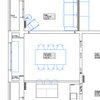What is a designer vs. an architect?
Comentarios (15)
katiemdenne
hace 10 añosWe are in the same situation and have just decided on using a designer rather than an architect. In my area, architects are required for structures larger than 10,000 sq ft (or something like that), and they are about 3-10 times the cost if a designer. An architect told me that if he were building a home, he'd hire a designer with lots of experience over an architect any day! Best of luck!cme44 agradeció a katiemdennehayleydaniels
hace 10 añosI'd hire an architect long before I'd hire a designer if I was building a home. it's the difference between hiring a nurse practioner vs a brain surgeon to remove a brain tumor!! You want the structural part of your home to be sound, and then you can worry about paint color and throw pillows.cme44 agradeció a hayleydanielsIronwood Builders
hace 10 añosThe difference between an architect and a designer is in a license. Many designers went to the same school, got the same degree, did the same internship and decided not to get a license. With the license...you know the level of schooling and testing was done to insure a level of knowledge applicable to your goal. Finding a designer that will have the same education is hit or miss. One other important difference is that architects often carry insurance for errors and omissions, liability insurance if they screw up (it happens...they're human). Siting a home on a lot, determining the flow of spaces and uses, influencing style and material selection....far more than the average designer does. But structurally, most architects are good at making pretty pictures...go to a licensed structural engineer to make sure stuff stays where your want it to. You will note, at no time have I said "all" or "none". Each of these design professionals (professionals get paid to do what they do, amateurs don't) is an individual, with individual strengths and weaknesses. Human.cme44 agradeció a Ironwood Builderscme44
Autor originalhace 10 añosÚltima modificación: hace 10 añosThanks for the comments! I was thinking you take the design to an architect to get the engineering and drawings done. That's obviously not true.Brickwood Builders, Inc.
hace 10 añosIn our area, none of the architects will certify the engineering on their plans so you have to hire an engineer separately for that. We also don't see architects here specifying materials (which I think they should). If you expect that service, make sure you talk with the architect to ensure they provide it.cme44 agradeció a Brickwood Builders, Inc.Design Elements
hace 10 añosIronwood builders is correct. I learned how to construct a home from foundation up in school. Along with all building codes. Difference is the license. But, might be a good idea to hire both at the same time. Designers can help modify an architects space right from the beginning to focus on the small details that will make the space.Design Elements
hace 10 añosAlso, designer don't just pick out paint colors and throw pillows. We do a lot more than that :)katiemdenne
hace 10 añosIn my local, all floor plans, whether created by an architect or a designer, must be approved by a structural engineer before you're granted a building permit. From what I've learned, if you want to waist some money, get an architect. If your house is massive, also get an architect. Otherwise, an experienced designer is the way to go for the average custom home design.Dullea and Associates Inc.
hace 10 añosI am a residential designer and carry the same errors and omissions insurance as a licensed architect and/or engineer.
I agree with much of what Thomas Kutch stated above. When it comes to designing a home you should look at the body of work and capabilities of those you are considering for the design of your home. You'll likely be best served by finding an individual or firm that focuses solely on residential design.cme44
Autor originalhace 10 añosThanks, Design Elements. I definitely wasn't talking about THAT KIND of designer yet! :-)
Yes, S. Thomas Kutch, I was talking about a Residential Designer. The one thing I learned from this process is that they also have to care about your project. I hired the "big guy" in town, but it turned out he hadn't listened to my input and it was clear that my project was just another invoicing opportunity for him. I do acknowledge that none of his shortcomings necessarily seem to be because he is a designer vs. an architect. He had no interest in seeing the land I'm building on or any likes or dislikes I have. I should have walked away when I got a feel for his personality -- my bad.
Which leads me to Dullea and Associates -- personality definitely plays an important role. If a person doesn't have the people skills to communicate effectively, a favorable outcome may well be a happy accident. (Same is true in my career -- information technology.) You have to be able to clarify the language for a client and you have to be able to help them bring you the information you need from them, because they may not know exactly what they want.
I am now about to hire an architect. Her first meeting with me was ON THE PROPERTY rather than in her office -- a big tell. She started talking to me about my options for basement construction, crawl space and slab (advantages/disadvantages/costs), and incorporating the natural lay of the land and the views into the design. I knew I was with the right person. She even drove me around the area to point out things I liked and didn't, materials, colors, shingle types -- she LISTENED! She talked to me about a number of packages available from her firm and I'm very excited to see what my options are. She talked about having my builder use his own electrician to do the wiring drawings vs. her design being implemented by him. Same with HVAC guy and plumbing company.
For readers, I also want to say that I'm also using a realtor. Probably an unusual situation. She worked countless hours looking for a house for me for a year before we found this property to build on, so I wanted to compensate her for some of her time anyway. She has worked on a number of local building projects, both commercial and residential. She was a rare find with an eye on the details, great relationships with local agencies and businesses, and the experience to ask the right questions for me -- from the lot prep, forward. Her advice has also really been worth the money, and I know her expertise will be worthwhile during the building process because she really "owns" her projects. (She isn't actual "costing" me anything because she saved me more on my land purchase than I'll be paying her in commission on the house!) She also found me the architect -- I should have gone with her recommendation to begin with rather than the "biggest guy in town." Lastly, she has also provided me important information to consider about what gives my house the best chance of resale later (like adding a powder room, etc.).
Thanks to this forum and another on Houzz, I'm better on my way to a successful project! Again, thanks for all the input.Mangrove Bay Design & Lighting
hace 8 añosS. Thomas Kutch Thank you for clarifying... it's a constant battle to educate our clients.
Sarah Lee
hace 7 añosA good Interior Designer brings an Architect on board once decisions have been made. This saves lots of time and money! Designers and Architects typically have good relationships and work together to make sure your dream home is built the way you want it and it is constructed correctly before any building starts.
When selecting Designers or Architects I suggest you see examples of their work including construction documents. After you collect the information as to their skills pick the qualified person you feel a connection to. You are going to work with this person for quite some time, and they are bringing your dreams to reality.
Cheers - Sarah LeeInterior Designer
916.730.6208
Smith Architectural Studio
hace 5 añosThink of an architect as the Master Designer and Project Facilitator. (We are like the Ring Leader of a multi-ring Building Circus). An architect is for the client that wants a thoroughly thought out design and structure that will be tailored for the end users. This is what we are trained and licensed for. Architects will look at the big picture and create a design that will take in the owners needs, desires and budget, the governing agencies requirements, the community's concerns and the environmental impacts. Architects will bring in other consultants, engineers, and specialized designers to create a completely detailed design and set of construction documents for building the project. Architects also work with the contractor/s to ensure that the construction process goes smoothly and remains consistent with the design intent and the construction documents.
faithbldr
hace 5 añosThere have been some excellent points made here. First and formost remember you are hiring a person not a tittle. As a builder I have worked with both. As a home owner you have to decide what is important to you before you buy the land. Is the area or land more important than the house design? Walk out basements don't work on flat or lots that slope to the front. Porch heights. House shapes can be dictated by lot size and shape. Most in town lots have restrictions that you should be aware of before you purchase. A good experienced local builder is the key to a smooth build. Bring one on early is important. Not many are willing to take the time to walk you through the process from begining to end but that's the Gem your looking for. A good GC (general contractor/builder) will have a better hand on cost to build and ways to control cost. State to state and county by county codes and regulations change so hire local. Be as speciffic on what you want in your home as you can, even the little things. Building a home is stressfull at best so make sure you can communicate well with your team.
In most areas you will need the following an Architect or designer, a structural engineer, and a site engineer. The site engineer will send a suryeor out to do a topicigraphical survey and mark the building area on the lot for the Architect or designer. The house will be designed or modified to fit. Now a good GC will be able to see if modifing the site plan can save you money or improve the appearance of your home, For example raising the basement floor height could save you thousands in excavation and dirt removal cost. The goal is to balance the lot to were nothing is hauled off or brought in (not always possible). The GC can explain how steep any slopes will be as well as where the water will flow. On high end projects you will be adding a landscape Architect or designer into the mix. There is more involled but not trying to write a book.
I have worked with award winnig Architects which supply very detailed plans for a price $28,000 but if you building a $2 mil home I would recomend it. I have seen plans from Archtects for houses ranging from 4,500 - 11,000 square foot range for the $18,000 price range that were just basic plans that were full of errors that would create structural issues. Some I can't believe made it through plan review by the county. In short there are some Architects that were given a rubber stamp that should have been put in rubber room. I have seen plans from designers that were very good with above average details for $8,000 - $10,000 on house ranging from 4,000 to 6,000 square feet. The Architect or designer usually hire there own structural engineer and the cost is included in the plans. So having a GC review the plans before they are finalized can save time, money, and stress. Did I mention it's stressful on a good day and an awsome test for you marriage.
Now get a flat fee from the Architect or designer. You want preliminary plan with 2 revisions after your review and no charge for missing or interpretation of plans. Both like to give you a price and add for extras. Now if your building the $2 mil plus story book house then getting the Architect involved with a couple of site visits at critical times is a good idea and a final walk through.
Now with all that being said we are back to hiring people. Some Architects have a tendencey to want to design what they want and be a little harder to work with. Find an Architect or designer that is flexable. I have run across 1 designer that was very hard to work with as well. Your GC can make recomendations on people he has worked with in the past but do your homework in hiring anyone.
In VA an Architect can design anything and a designer is limited to single family homes 3 stories or less. There are Architectural companies with staff which are a must if doing a comercial project. Home based Architects and designers have less overhead and there pricing reflects that. Home based Architects aren't less sucessful in most cases the ones I have worked with tend to want less stress and a more personal relationship with there customers. Designers are typicaly interns, interns that decided they were content staying a designer rather than complete the internship under an Architect and test for Architect, or a few from the building back ground.
There are builders that have started doing Design, Build, and Maintain. This is another option.
I have designed all our spec homes and have 2 sons getting out of colledge soon. We're looking at the possibility of becoming a design build firm.
My recomendation take pictures of house styles you like and kitchens, baths and anything you see you like or want. The internet is great for this as well. Pick the area you want to live. Get your team assembled, then go shopping for a lot.
Very few projects go smoothly start to finsh. Learn to find the light side take lots of pictures. pick up a shovel slap on a little mud and make it look like you did something. Don't build a empty house, build a home with memories.

Volver a cargar la página para no volver a ver este anuncio en concreto




S. Thomas Kutch